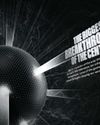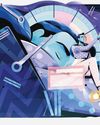
WHAT’S WRONG WITH PASSWORDS?
The very first digital passwords were invented by an MIT professor in the mid 1960s who needed to give multiple users private access to the same giant computer. Passwords soon became ubiquitous in our computers and it’s easy to see why – a simple, memorable word is quick and easy to input when you want to gain access to your computer.
But that’s also the problem with passwords. A simple, memorable string of characters such as ‘password’ or ‘123456’ is easy to guess, and when hackers ask their computers to guess millions of passwords a second, even complex words and codes can be broken instantly.
The best way to thwart this kind of hacking is to use long passwords, as the number of combinations (and difficulty of guessing) increases exponentially with length. For example, ‘My!_Garden_ ShedWith13Daffodils#and17Tulips_Outside’ is considerably harder to guess than ‘MyPa55wo2d!xxx’.
Nevertheless, it’s recommended that you use a different password for every new application, so that if one is exposed by a hacker, none of your others will be at risk. Unfortunately, today this has become unfeasible as everything from Netflix to your bank requires a password – it’s not possible for us to remember hundreds of different codes.
Our solution? We write the passwords down, often on sticky-notes stuck to the monitor or keyboard, or on a pad kept in a nearby desk. Alternatively, we use password manager apps that remember everything for us but provide a one-stop-shop for hackers.
Bu hikaye BBC Science Focus dergisinin June 2023 sayısından alınmıştır.
Start your 7-day Magzter GOLD free trial to access thousands of curated premium stories, and 9,000+ magazines and newspapers.
Already a subscriber ? Giriş Yap
Bu hikaye BBC Science Focus dergisinin June 2023 sayısından alınmıştır.
Start your 7-day Magzter GOLD free trial to access thousands of curated premium stories, and 9,000+ magazines and newspapers.
Already a subscriber? Giriş Yap

THE WORST IDEAS OF THE 21ST CENTURY
NOT ALL IDEAS CAN BE HITS. ALONGSIDE GROUND-BREAKING INNOVATIONS, 21ST-CENTURY SCIENTISTS HAVE HELMED THEIR SHARE OF WILD TECH FLOPS, DUBIOUS THEORIES AND OVERHYPED BREAKTHROUGHS. HERE ARE THE BIGGEST TO FORGET

10 IDEAS THAT WILL SHAPE YOUR NEXT 25 YEARS
Predicting the future is considered a fool's game. But it's one many of us like to play.

THE BIGGEST BREAKTHROUGHS OF THE CENTURY
We're a quarter of the way into the new century. To mark this milestone, we asked the UK's top minds to highlight some of the game-changing scientific breakthroughs shaping our world since the year 2000

DO THE SCIENCE COGNITIVE SHUFFLE
Trouble sleeping? A lot on your mind? Use this trick and sedate your synapses

WHAT DETERMINES HOW MANY ABS I CAN GET?
Assuming you're a human being, you have exactly the same number of abs as everybody else: two.

HOW CAN I IDENTIFY MY PSYCHOLOGICAL BLIND SPOT?
In the 1950s two American psychologists, Joseph Luft and Harrington Ingham, proposed a way of thinking about psychological blind spots - things you don't know about yourself - that they called the 'Johari Window' (the term is a combination of their first names).

How can I change my personality?
Want to become more confident, extroverted or assertive? Science shows that with a few simple changes, you can unlock your best self

Could your cosmetics be harming your health?
Cosmetic companies are phasing out microplastics and so-called 'forever chemicals' to help protect consumers.

extraterrestrial US Congress is talking about activity again. Is the truth really out there?
Despite several testimonies, the question remains frustratingly unanswered

Map of 100 million human body cells revealed
Over three dozen new studies mark significant milestone towards complete Human Cell Atlas